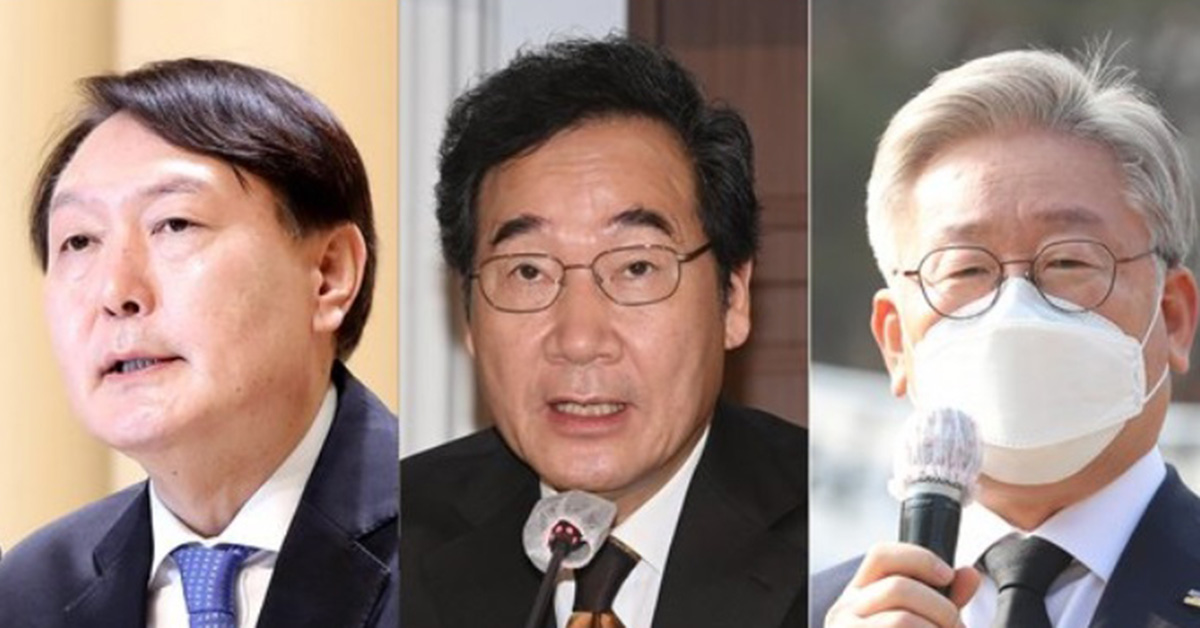
Prosecutor General Yoon Seok-yeol (left), Democratic Party representative Lee Nak-yeon (center), and Gyeonggi-do governor Lee Jae-myeong (right). Yonhap News·News1·Newsis
The direction of the next power is always of interest. Moreover, when the term of office of the incumbent president is nearing the final stage, there is no need to say more. That’s why it’s popular polls for presidential election runners.
In celebration of the new year, opinion poll companies are releasing the results of the voter approval ratings one after another. In most surveys, the’Third-Lecture’ system is clear, but the leaders are different depending on the survey companies. In some investigations, Gyeonggi Governor Lee Jae-myeong advances to the fore, while in other investigations, Prosecutor General Yoon Seok-yul takes the first place with a margin.
YTN-Realmeter surveyed 1,000 men and women aged 18 and over nationwide (±3.1% points for a 95% sample error), according to the results of a 1~2 day survey, the approval rate of President Yoon was 30.4%, for the first time 30%. Broke the line. It was 10.1 percentage points ahead of Governor Lee (20.3%), the second place, and a double score difference from the leader of the Democratic Party (15.0%) along with Nak-yeon Lee, the third place.
The results of KBS-Korea Research’s December 27-29 survey conducted with a lag of around 5 days (for 1,000 men and women 18 years of age or older, ±3.1% points on the 95% confidence level of the sample error) were different. Governor Lee was 21.7% and CEO Lee 16.9%, and President Yoon’s approval rating was 13.8%, 7.9 percentage points behind Lee. In the SBS-Ipsos survey (December 28-30), Governor Lee took the lead with 23.6% of Governor Lee, 18.5% of President Yoon, and 16.7% of CEO Lee.
As such, in a total of 10 presidential candidate preference surveys conducted from December 27 to January 2, Governor Lee ranked first in seven surveys and President Yoon ranked first in three surveys.

The presidential election polls were mixed according to the survey method. Graphic = Reporter Jaemin Shin [email protected]
Considering that the results of surveys conducted at the same time vary widely, experts analyze that “the difference in the method of polling has a decisive effect.” In fact, all seven polls led by Lee Governor were interviewed by phone, and all three polls, headed by Mr. Yun, were automated response (ARS). In particular, the YTN-realmeter survey, where Yun’s approval rating exceeded 30%, was 100% ARS (wired 20%, wireless 80%), and the KBS-Korea Research survey, where Yun was ranked third, was 100% wireless telephone interview. . Unlike a phone interview, where the investigator randomly calls and interviews the respondents directly, ARS is an automatic answer, so there is no need to go through the investigator.
It is analyzed that Yoon’s strength in the ARS survey was due to the active response of the supporters of’shy Yoon Seok-yeol’ who rarely reveals his conservative tendencies in front of others. Professor Han Gyu-seop of Seoul National University’s Department of Media and Information Studies said, “In the ARS survey that does not go through an investigator, it seems that many respondents with anti-Moon Jae-in tendencies have chosen to support President Yoon.” Respondents may have been actively involved in the investigation.”
Some analyzes say that even in the same ARS survey, there is a difference depending on whether it is a landline (home phone) or wireless (mobile phone). In the Daily-R&Search survey on December 27-29 conducted by 100% wireless ARS method (1038 people over the age of 18, ±3.0% points on the 95% confidence level of the sample error), President Yoon recorded 23.5%, Governor Lee (21.2 %) and Lee (19.3%), but the gap was within the margin of error at 2.3 percentage points. The gap (10.1% points) was smaller than that of the YTN-real meter survey, which reflected 20% of wired ARS. An official from a public opinion survey company who requested anonymity said, “The wire survey, which has a high response rate for the elderly, tends to be advantageous for conservative candidates.”
Experts point out that polls should not be mistaken for reflecting the election vote. Professor Lee Jun-woong of the Department of Media and Information Studies at Seoul National University emphasized, “It is difficult to evaluate that it shows accurate public sentiment because the differences in the respondents’ political orientation, questionnaire questions, and respondent sampling are large depending on the survey company.
Reporters Sohn Kook-hee and Kim Jun-young [email protected]
